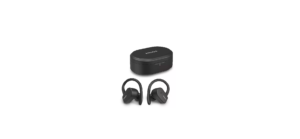Philips TAT2205 Headphones 2000 Series User Manual

Important safety instructions
Hearing Safety
![]()
- To avoid hearing damage, limit the time you use headphones at high volume and set the volume to a safe level. The louder the volume, the shorter the safe listening time is.
Be sure to observe the following guidelines when using your earpieces.
- Listen at reasonable volumes for reasonable periods of time.
- Be careful not to adjust the volume continuously upwards as your hearing adapts.
- Do not turn up the volume so high that you can’t hear what’s around you.
- You should use caution or temporarily discontinue use in potentially hazardous situations.
- Excessive sound pressure from earphones and headphones can cause hearing loss.
- Using headphones with both ears covered while driving is not recommended and may be illegal in some areas while driving.
- For your safety, avoid distractions from music or phone calls while in traffic or other potentially dangerous environments.
General information
To avoid damage or malfunction:
![]() Caution
Caution
- Do not expose headphones to excessive heat
- Do not drop your headphones.
- Headphones shall not be exposed to dripping or splashing.
- Do not allow your headphones to be submerged in water.
- Do not use any cleaning agents containing alcohol, ammonia, benzene, or abrasives.
- If cleaning is required use a soft doth, if necessary dampened with a minimum amount of water or diluted mild soap, to clean the product.
- The integrated battery shall not be exposed to excessive heat such as sunshine, fire or the like.
- Danger of explosion if battery is incorrectly replaced. Replace only with the same or equivalent type.
About operating and storage temperatures and humidity
- Operate or store in a place where temperature is between 0°C (32°F) and 60°C (140 °F) (up to 90% relative humidity.
- Battery life may be shorter in high or low temperature conditions.
Your Bluetooth wireless earpieces
Congratulations on your purchase, and welcome to Philips! To fully benefit from the support that Philips offers, register your product at www.philips.com/welcome. With this Philips wireless earpieces, you can:
- enjoy convenient wireless handsfree calls;
- enjoy and control wireless music;
- switch between calls and music.

What’s in the box

Other devices
A mobile phone or device (e.g. notebook, PDA, Bluetooth adapters, MP3 players etc) which supports Bluetooth and is compatible to the earpieces (see ‘Technical data’ on page 10).
Overview of your Bluetooth wireless earpieces

Get started
Charge the battery
![]()
- Before you use your earpieces for the first time, place the earpieces in the charging case and charge the battery for 2 hours for optimum battery capacity and lifetime.
- Use only the original USB charging cable to avoid any damage.
- Finish your call before charging the earpieces, as connecting the earpieces for charging will power the earpieces off.
Charging case
Connect one end of the USB cable into the charging case, and another end into the power source.
- The charging case starts charging.
- Charging process is verified by the blue LED light on the front panel,
- When the charging case is fully charged, the blue light goes on.

![]() Tip
Tip
- The charging case serves as a portable backup battery for charging the earpieces. When the charging case is fully charged, it supports 3 full recharge cycle for the earpieces.
Battery LED indicator on Charging case
While charging earpieces, Blue LED will light on.
- 4th blue LED lights ashes once every 1s and others stay on for 75-100% power
- 1st and 2nd blue LED lights stay on and 3rd & 4th lights turn on successively, flashing once every 1s for 50-75% power
- 1st blue LED lights stay on and 2nd, 3rd & 4th LED lights turn on successively, flashing once every 1s for 25-50% power
- 4 blue LED lights flashing every 1s in cycles for 0-25% power
Earpieces
Place the earpieces in the charging case.
- The earpieces start charging.
- Charging process is verified by white LED light on the earpieces.
- When the earpieces is fully charged, the white light goes o.

![]() Tip
Tip
- Normally, a full charge takes 2 hours (for the earpieces or charging case).
Pair the earpieces with your Bluetooth device at the fist time
- Make sure that the earpieces is fully charged.
- Auto power on: open the charging capsule, the earpieces discharged and the blue LED indicator ash for 3 times with “power on” voice prompt; Manual power on: on both earpieces press and hold the multi-function buttons for approxinmately 3s.

- The right earphone led flashes alternately in white and blue, and the left earphone LED is o for 10s and the blue LED flashes once.
- Both earpieces are now powered on and are paired with each other.
- The earpieces is now in pairing mode and is ready to pair with a Bluetooth device (e.g. a mobile phone).

- Turn on the Bluetooth function of your Bluetooth device.
- Pair the earpieces with your Bluetooth device. Refer to the user manual of your Bluetooth device.
- In right earpieces, it has voice “Connected” and LED goes o on both earpieces and ash 1 time every 10s. You can use your device to play music or make a call.
![]() Note
Note
- After powering on, if the earpieces cannot previously connected Bluetooth device, it will automatically switch to pairing mode.
The following example shows you how to pair the earpieces with your Bluetooth device.
- Turn on the Bluetooth function of your Bluetooth device, select Philips
- Enter the earpieces password “0000” (4 zeros) if prompted. For those Bluetooth devices featuring Bluetooth 3.0 or higher, no need to enter a password.

Single earpieces pairing (Mono mode)
- Take the right earpieces (“Master device”) from the charging case, the earpiece will power on automatically. There will be a voice “Power on” from right earpieces.

- Turn on the Bluetooth function on your device, search for “Philips UT102” tap to connect. (Please refer to P.6)

- Once the pairing succeed, you will hear a voice “Connected” and the indicator light will be off.
Pair the earpieces with another Bluetooth device
If you have another Bluetooth device that you want to pair with the earpieces, make sure the Bluetooth function in any other previously paired or connected devices are turned off. Then follow the steps in ‘Pair the earpieces with your Bluetooth device at the first time’.
![]() Note
Note
- The earpieces stores 1 device in the memory. If you try to pair more than 2 devices, the earliest paired device is replaced by the new one.
Use your earpieces
Connect the earpieces to your Bluetooth device
- Turn on the Bluetooth function of your Bluetooth device.
- Take both earpieces from the charging case, the earpieces will power on and reconnect automatically.
- If no device is connected, the earpieces will automatically turn off after 5 mins.
- Both earpieces are now powered on and are paired with each other automatically.
- The earpieces will search the last connected Bluetooth device and reconnect to it automatically.
- If the last connected one is not available, the earpieces will search and reconnect to the second last connected device.
![]() Tip
Tip
- The earpieces cannot connect to more than 1 device at the same time. If you have two paired Bluetooth devices, only turn on the Bluetooth function of the device that you want to connect.
- If you turn on the Bluetooth function of your Bluetooth device after turning on the earpieces, you have to go to the Bluetooth menu of the device and connect the earpieces to the device manually.
![]() Note
Note
- If the earpieces fails to connect to any Bluetooth device within 5 minutes, it will turn off automatically to save the battery life.
- In some Bluetooth devices, connection may not be automatic. In this case, you have to go to the Bluetooth menu of your device and connect the earpieces to the Bluetooth device manually.
Power on/off

Manage your calls and music


LED indicator status


Battery LED indicator on earpieces status
It will show a battery indicator on Bluetooth device after connected to earpieces.

How to wear

Factory reset the earpieces
If you encounter any pairing or connection issue, you can follow the following procedure to factory reset your earpieces.
- On your Bluetooth device, go to the Bluetooth menu and remove Philips TAT2205/TAT2235/TAT2245 from the device list.
- Turn off the Bluetooth function of your Bluetooth device.
- Put both earpieces back to charging case. Both earpieces flashes white led. Press and hold both earpieces function button for 4s,until earpieces flashes twice white led.
- To pair the earpieces with a Bluetooth device, turn on the Bluetooth function of your Bluetooth device, select Philips TAT2205/TAT2235/TAT2245
Technical data Note notice.
Earpieces
- Music time: 4 hours additional 8 hrs with charging case)
- Talk time: 3 hours (additional 7 hrs with charging case)
- Standby time: 50 hours
- Charging time: 2 hours
- Rechargeable lithium ion battery: 4 mAh on each earpiece
- Bluetooth version: 5.1
- Compatible Bluetooth profiles:
- HSP (Hands-Free Profile-HFP)
- A2DP (Advanced Audio Distribution Profile)
- AVRCP (Audio Video Remote Control Profile)
- Supported audio codec: SBC
- Frequency range: 2.402-2.480 GHz
- Transmitter power: < 4 dBm
- Operating range: Up to 10 meters (33 feet)
Charging case
- Charging time: 2 hrs
- Rechargeable Li-ion battery: 320mAh
- Input power: 5.0V⎓0.5A
![]() Note
Note
- Specifications are subject to change without notice.
Notice
Declaration of conformity
Hereby, MMD Hong Kong Holding Limited declares that this product is in compliance with the essential requirements and other relevant provisions of Directive 2014/53/EU. You can nd the Declaration of Conformity on www.p4c.philips.com
Disposal of your old product and battery
![]() Your product is designed and manufactured with high quality materials and components, which can be recycled and reused.
Your product is designed and manufactured with high quality materials and components, which can be recycled and reused.
![]() This symbol on a product means that the product is covered by European Directive 2012/19/EU.
This symbol on a product means that the product is covered by European Directive 2012/19/EU.
![]() This symbol means that the product contains a built-in rechargeable battery covered by European Directive 2013/56/EU which cannot be disposed of with normal household waste. We strongly advise you to take your product to an official collection point or a Philips service centre to have a professional remove the rechargeable battery. Inform yourself about the local separate collection system for electrical and electronic products and rechargeable batteries. Follow local rules and never dispose of the product and rechargeable batteries with normal household waste. Correct disposal of old products and rechargeable batteries helps prevent negative consequences for the environment and human health.
This symbol means that the product contains a built-in rechargeable battery covered by European Directive 2013/56/EU which cannot be disposed of with normal household waste. We strongly advise you to take your product to an official collection point or a Philips service centre to have a professional remove the rechargeable battery. Inform yourself about the local separate collection system for electrical and electronic products and rechargeable batteries. Follow local rules and never dispose of the product and rechargeable batteries with normal household waste. Correct disposal of old products and rechargeable batteries helps prevent negative consequences for the environment and human health.
Remove the integrated battery
If there is no collection/recycling system for electronic products in your country, you can protect the environment by removing and recycling the battery before disposing the headphones.
- Make sure the earpieces is disconnected from the charging case before removing the battery.

- Make sure the charging case is disconnected from the USB charging cable before removing the battery.

Compliance with EMF
This product complies with all applicable standards and regulations regarding exposure to electromagnetic fields.
Environmental information
All unnecessary packaging has been omitted. We have tried to make the packaging easy to separate into three materials: cardboard (box), polystyrene foam (butter) and polyethylene (bags, protective foam sheet.) Your system consists of materials which can be recycled and reused if disassembled by a specialized company. Please observe the local regulations regarding the disposal of packaging materials, exhausted batteries and old equipment.
Notice of compliance
The device complies with the FCC rules, Part 15. Operation is subject to the following two conditions:
- This device may not cause harmful interference, and
- This device must accept any interference received, including interference that may cause undesired operation.
Trademarks
Bluetooth
The Bluetooth® word mark and logos are registered trademarks owned by Bluetooth SIG, Inc. and any use of such marks by Top Victory Investment Limited is under license. Other trademarks and trade names are those of their respective owners.
Siri
Siri is a trademark of Apple Inc., registered in the U.S. and other countries.
Google and Google Logo are registered trademarks of Google Inc.
DOWNLOAD PDF LINK
https://www.philips.com.pk/c-p/TAT2205WT_00/2000-series-in-ear-true-wireless-headphones





